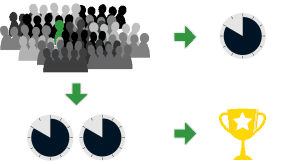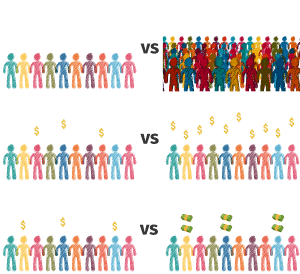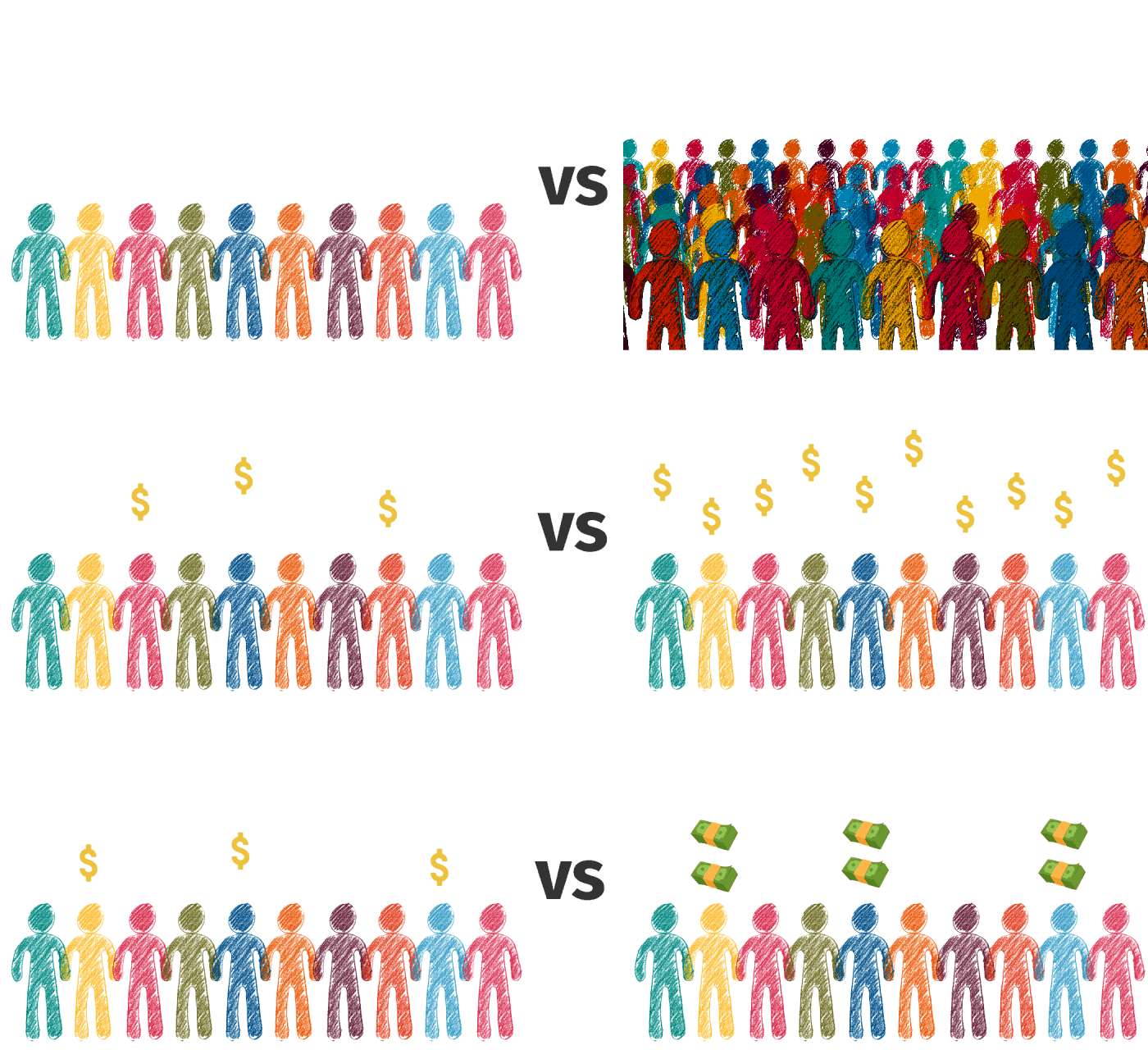“When will I make money?”
“How much money can I make?”
These are really common, reasonable questions that are, unfortunately, impossible to answer with any degree of accuracy. I can give you a general idea of what to expect, though.
When You’ll Start Making Money
How long it takes to succeed is mainly determined by two factors: competition and effort. A person working 20 hours a week in a really low-competition niche is going to get there a lot faster than a person working 10 hours a week in the same niche.

Aside from competition and effort, there are several other moving parts that can affect how long it’s going to take to see income, such as how well you’re following what you’ve learned, the quality of your work, and how well you learn from early mistakes.
How Much Money You Can Make
How much money can be made is determined by how large an audience is, how much of a buying audience they are, and how well the offers in that industry pay.
Having an audience of 100 million will provide a much higher income cap than having an audience of 100 thousand. That said, having a large audience doesn’t mean anything if they aren’t a buying audience; that is, an audience that is willing to spend money. Furthermore, an industry that pays $100 per offer will provide a much higher income cap than an industry that pays $20 per offer.

This all may seem like no-brainers, but when picking a niche, these factors are often overlooked. Picking the right niche can greatly influence how much income is earned within a certain period of time.
Money-Based Goals: How to Set Yourself Up for Disappointment
Knowing A) that it’s impossible to predict how much money one will make and B) how much time is required to see results, setting money-based goals doesn’t make any sense.
On the surface, it may seem to make sense to set a goal to earn $1,000 a month by the end of 12 months. It’s okay to have this kind of goal in mind, but don’t get too attached: a lot of the factors that affect this goal are out of your control.

If you set a money-based goal and don’t meet it, it’s going to feel utterly deflating and defeating. Setting money-based goals are what make people wash out of the industry.
So, what does make sense? If you shouldn’t be setting money-based goals, what should you be basing your goals on?
Task-Based Goals: Setting the Right Kind of Goals
The smartest goals and milestones to set are the ones you’re in TOTAL control of. The quality of your content, the word count of your articles, how deep you dive during keyword research, and which keywords you’re targeting are all things you control.
You control how many hours you work per week, how efficient you are, how many posts you write in a week, and the quality of those posts.
Thus, it makes more sense to set goals like:
“I want to post (X) high-quality articles per week.”
“I want to improve my efficiency.”
“I need to fine-tune my processes so that for 20 hours of work, instead of posting 1 article, I’m producing two or three articles.”

Again, you are in control of the factors required to achieve these goals and how many hours you work each week. Your efficiency and article quality are completely up to you.
Adjusting those factors will make a tremendous difference in your Internet Marketing business. Posting high-quality content regularly, with carefully chosen keywords, will generate traffic. In the right niche, traffic will generate money.
How To Set Internet Marketing Objectives: Examples And Tips For Success
Task-oriented goals, rather than money-oriented goals, set an individual up for success because they’re in control of the tasks required to meet the goal. However, this also means missing task-based goals is entirely on the individual.
There’s nothing wrong with becoming upset if a task-oriented goal is missed; it’s part of the process. You have every right to feel dismayed, but don’t wallow in self-pity. Learn from your mistakes and move forward.

If your goal is to earn $1,000 per month at the end of six months, and you don’t meet it despite your best efforts, don’t be mad at yourself. Remind yourself that money-based goals are out of your control.
An important thing to understand is that no matter how controlled and consistently tasks are executed, the outcome is still unknown. Rest easy knowing you did everything you could and let the chips fall where they may.
At the very least, tweak financial goals so they’re less money driven:
“I want to create 100 high-quality posts within the next 12 months and, hopefully, that’s going to earn me $1,000 a month.”
If at the end of those 12 months you’re not hitting that kind of income, then at least you have a really good idea of what works, what doesn’t work, and what you should keep doing. Adjust your goals and tasks accordingly.
You’re Ready!
I hope you feel much more empowered now than you have ever felt going into this journey. I’ve been in this industry long enough to know in my heart that starting off with the right mindset is key to success in Internet Marketing. If you drill the concepts we discussed in Lessons 3 to 5 into your brain and take them to heart, you’re set up for success on the journey ahead.
Lessons 3–5 Key Takeaways
- “Get Rich Quick” is a big myth. Getting rich through Internet Marketing is never quick; it takes hard work and time.
- Success in Internet Marketing is not only measured through financial success; it’s measured by how much freedom it allows you to live the life you want.
- The most successful Internet Marketers have an Iron Mindset and never give up.
- You CAN learn to forge the Iron Mindset.
- By working at least 10 hours a week for six to 12 months, you can realistically aim to make $800 to $1,000 a month at the end of 12 months.
- You need $70 to $110 in startup capital, plus a desktop or laptop computer.
- Months 1 to 3 (Pushing Through the Trial and Error): Lots of learning and trial-and-error, plus learning how to create high-quality content in your niche.
- Months 4 to 6 (Second Guessing Everything): Second-guessing everything you’re doing and wondering if you’re doing it right.
- Months 7 to 9 (Early Signs of Traction): Seeing early signs of traction, depending on your niche and efforts.
- Months 10 to 12 (Potentially Generating a Part-Time Income): Starting to see enough traffic to generate a part-time income or more.
- High-Competition Niches (A Longer Journey): Add six to eight months to these milestones.
- Aim for traffic above all else during the early stages. Growth can be unpredictable.
- Focusing on task-oriented goals rather than money-oriented goals will set you up much better for success.
Recommended Readings

How To Create SMART Blog Goals When You’re A Beginner
Setting blog goals is essential for beginners. Learn how to set SMART blog goals to help keep you on the right track.
